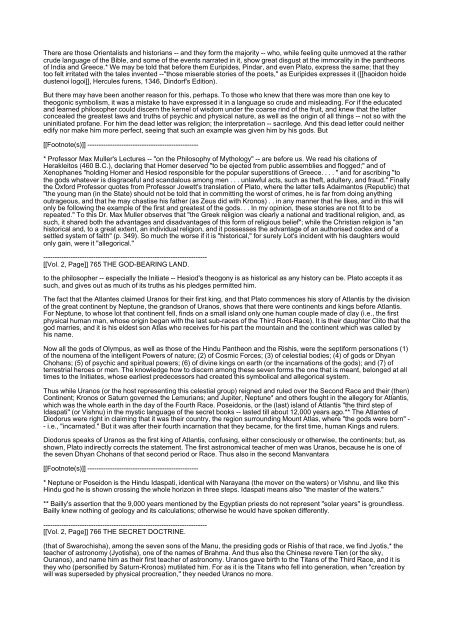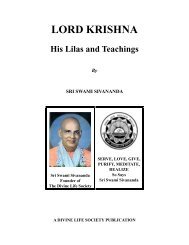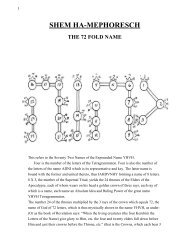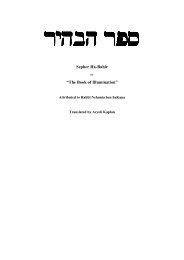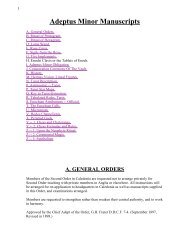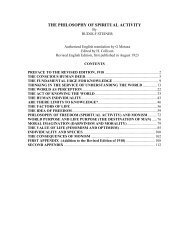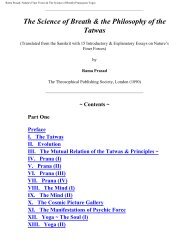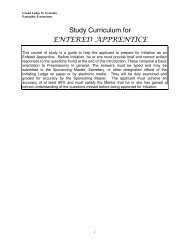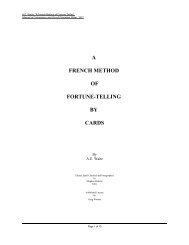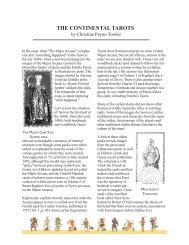Band 2 Anthropogenesis - H.P. Blavatsky
Band 2 Anthropogenesis - H.P. Blavatsky
Band 2 Anthropogenesis - H.P. Blavatsky
You also want an ePaper? Increase the reach of your titles
YUMPU automatically turns print PDFs into web optimized ePapers that Google loves.
There are those Orientalists and historians -- and they form the majority -- who, while feeling quite unmoved at the rather<br />
crude language of the Bible, and some of the events narrated in it, show great disgust at the immorality in the pantheons<br />
of India and Greece.* We may be told that before them Euripides, Pindar, and even Plato, express the same; that they<br />
too felt irritated with the tales invented --"those miserable stories of the poets," as Euripides expresses it ([[haoidon hoide<br />
dustenoi logoi]], Hercules furens, 1346, Dindorf's Edition).<br />
But there may have been another reason for this, perhaps. To those who knew that there was more than one key to<br />
theogonic symbolism, it was a mistake to have expressed it in a language so crude and misleading. For if the educated<br />
and learned philosopher could discern the kernel of wisdom under the coarse rind of the fruit, and knew that the latter<br />
concealed the greatest laws and truths of psychic and physical nature, as well as the origin of all things -- not so with the<br />
uninitiated profane. For him the dead letter was religion; the interpretation -- sacrilege. And this dead letter could neither<br />
edify nor make him more perfect, seeing that such an example was given him by his gods. But<br />
[[Footnote(s)]] -------------------------------------------------<br />
* Professor Max Muller's Lectures -- "on the Philosophy of Mythology" -- are before us. We read his citations of<br />
Herakleitos (460 B.C.), declaring that Homer deserved "to be ejected from public assemblies and flogged;" and of<br />
Xenophanes "holding Homer and Hesiod responsible for the popular superstitions of Greece. . . . " and for ascribing "to<br />
the gods whatever is disgraceful and scandalous among men . . . unlawful acts, such as theft, adultery, and fraud." Finally<br />
the Oxford Professor quotes from Professor Jowett's translation of Plato, where the latter tells Adaimantos (Republic) that<br />
"the young man (in the State) should not be told that in committing the worst of crimes, he is far from doing anything<br />
outrageous, and that he may chastise his father (as Zeus did with Kronos) . . in any manner that he likes, and in this will<br />
only be following the example of the first and greatest of the gods. . . In my opinion, these stories are not fit to be<br />
repeated." To this Dr. Max Muller observes that "the Greek religion was clearly a national and traditional religion, and, as<br />
such, it shared both the advantages and disadvantages of this form of religious belief"; while the Christian religion is "an<br />
historical and, to a great extent, an individual religion, and it possesses the advantage of an authorised codex and of a<br />
settled system of faith" (p. 349). So much the worse if it is "historical," for surely Lot's incident with his daughters would<br />
only gain, were it "allegorical."<br />
------------------------------------------------------------------------<br />
[[Vol. 2, Page]] 765 THE GOD-BEARING LAND.<br />
to the philosopher -- especially the Initiate -- Hesiod's theogony is as historical as any history can be. Plato accepts it as<br />
such, and gives out as much of its truths as his pledges permitted him.<br />
The fact that the Atlantes claimed Uranos for their first king, and that Plato commences his story of Atlantis by the division<br />
of the great continent by Neptune, the grandson of Uranos, shows that there were continents and kings before Atlantis.<br />
For Neptune, to whose lot that continent fell, finds on a small island only one human couple made of clay (i.e., the first<br />
physical human man, whose origin began with the last sub-races of the Third Root-Race). It is their daughter Clito that the<br />
god marries, and it is his eldest son Atlas who receives for his part the mountain and the continent which was called by<br />
his name.<br />
Now all the gods of Olympus, as well as those of the Hindu Pantheon and the Rishis, were the septiform personations (1)<br />
of the noumena of the intelligent Powers of nature; (2) of Cosmic Forces; (3) of celestial bodies; (4) of gods or Dhyan<br />
Chohans; (5) of psychic and spiritual powers; (6) of divine kings on earth (or the incarnations of the gods); and (7) of<br />
terrestrial heroes or men. The knowledge how to discern among these seven forms the one that is meant, belonged at all<br />
times to the Initiates, whose earliest predecessors had created this symbolical and allegorical system.<br />
Thus while Uranos (or the host representing this celestial group) reigned and ruled over the Second Race and their (then)<br />
Continent; Kronos or Saturn governed the Lemurians; and Jupiter, Neptune* and others fought in the allegory for Atlantis,<br />
which was the whole earth in the day of the Fourth Race. Poseidonis, or the (last) island of Atlantis "the third step of<br />
Idaspati" (or Vishnu) in the mystic language of the secret books -- lasted till about 12,000 years ago.** The Atlantes of<br />
Diodorus were right in claiming that it was their country, the region surrounding Mount Atlas, where "the gods were born" -<br />
- i.e., "incarnated." But it was after their fourth incarnation that they became, for the first time, human Kings and rulers.<br />
Diodorus speaks of Uranos as the first king of Atlantis, confusing, either consciously or otherwise, the continents; but, as<br />
shown, Plato indirectly corrects the statement. The first astronomical teacher of men was Uranos, because he is one of<br />
the seven Dhyan Chohans of that second period or Race. Thus also in the second Manvantara<br />
[[Footnote(s)]] -------------------------------------------------<br />
* Neptune or Poseidon is the Hindu Idaspati, identical with Narayana (the mover on the waters) or Vishnu, and like this<br />
Hindu god he is shown crossing the whole horizon in three steps. Idaspati means also "the master of the waters."<br />
** Bailly's assertion that the 9,000 years mentioned by the Egyptian priests do not represent "solar years" is groundless.<br />
Bailly knew nothing of geology and its calculations; otherwise he would have spoken differently.<br />
------------------------------------------------------------------------<br />
[[Vol. 2, Page]] 766 THE SECRET DOCTRINE.<br />
(that of Swarochisha), among the seven sons of the Manu, the presiding gods or Rishis of that race, we find Jyotis,* the<br />
teacher of astronomy (Jyotisha), one of the names of Brahma. And thus also the Chinese revere Tien (or the sky,<br />
Ouranos), and name him as their first teacher of astronomy. Uranos gave birth to the Titans of the Third Race, and it is<br />
they who (personified by Saturn-Kronos) mutilated him. For as it is the Titans who fell into generation, when "creation by<br />
will was superseded by physical procreation," they needed Uranos no more.


